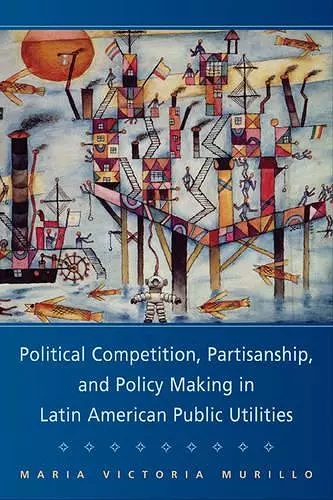Political Competition, Partisanship, and Policy Making in Latin American Public Utilities
Format:Paperback
Publisher:Cambridge University Press
Published:24th Aug '09
Currently unavailable, and unfortunately no date known when it will be back
This paperback is available in another edition too:
- Hardback£40.00(9780521884310)

Shows that electoral competition and partisan government helped balance the conflicting demands of voters' interests with the financial pressures generated by capital scarcity.
Murillo's analysis of the Latin American electricity and telecommunications sectors shows that different degrees of electoral competition and the partisan composition of the government were crucial in resolving policymakers' tension between the interests of voters and the economic incentives generated by international financial markets and private corporations.This book studies policymaking in the Latin American electricity and telecommunication sectors. Murillo's analysis of the Latin American electricity and telecommunications sectors shows that different degrees of electoral competition and the partisan composition of the government were crucial in resolving policymakers' tension between the interests of voters and the economic incentives generated by international financial markets and private corporations in the context of capital scarcity. Electoral competition by credible challengers dissuaded politicians from adopting policies deemed necessary to attract capital inflows. When electoral competition was low, financial pressures prevailed, but the partisan orientation of reformers shaped the regulatory design of market-friendly reforms. In the post-reform period, moreover, electoral competition and policymakers' partisanship shaped regulatory redistribution between residential consumers, large users, and privatized providers.
'This is a splendid, shrewd book on the political economy of policy reform and policy making in Latin America. Focusing on the regulation of two key economic sectors, telecommunications and electricity, Murillo shows that, even at the height of the liberalization and privatization waves of the last decades, electoral competition and the partisan composition of governments crucially mattered to explain how politics and distributional considerations shape the economy. This is a very welcome rebuttal of the convergence and globalization literatures and a must-read book for any political economist.' Carles Boix, Princeton University
'Globalization and economic pressure, party competition and institutions, expertise and epistemic communities – this excellent book manages to integrate these elements into a systematic analysis of public policy outputs in Latin America. Many authors do one or the other, but Murillo combines them into an analytic structure that actually tells about the outputs, about what happens, and does so in a way with applicability to comparative politics generally. A must-read for the integration of policy with politics.' Peter Gourevitch, University of California, San Diego
'In an incisive and expertly argued analysis, Murillo demonstrates that beneath ostensible policy convergence, domestic political competition influenced the timing of the privatization of public utilities in Latin America, while partisan considerations determined the content of these policies. This sophisticated and nuanced analysis redefines our understanding of the interplay of domestic competition and international policy pressures.' Anna Grzymala-Busse, University of Michigan
'We are re-learning the painful lesson that functioning markets require the right regulatory touch. Vicki Murillo takes up the political economy of regulation in Latin America's telecomm and utilities sectors, activities in which inappropriate regulation has been highly costly in the past. She shows deftly how regulation in Argentina, Chile and Mexico, as elsewhere, is a function of politics. Murillo finds that political competition can deter regulatory reform, but that partisan politics matters for the design of both institutions and policy. This book will push thinking on de-regulation – and re-regulation – beyond the standard nostrums to a more nuanced understanding of alternative ways of combining states and markets.' Stephan Haggard, University of California San Diego
'This complex but lucid study makes an important contribution to the mounting evidence that domestic politics continue to matter greatly for policy choices of Latin American governments in the era of globalization and neoliberalism. In a theoretically innovative and empirically sophisticated analysis, Murillo demonstrates how electoral competition and partisan affiliations of governments shaped policy choices with distinctive distributive implications for an array of different interests in the course of privatization and regulation of public utilities.' Evelyne Huber, University of North Carolina
ISBN: 9780521711227
Dimensions: 228mm x 153mm x 18mm
Weight: 420g
312 pages